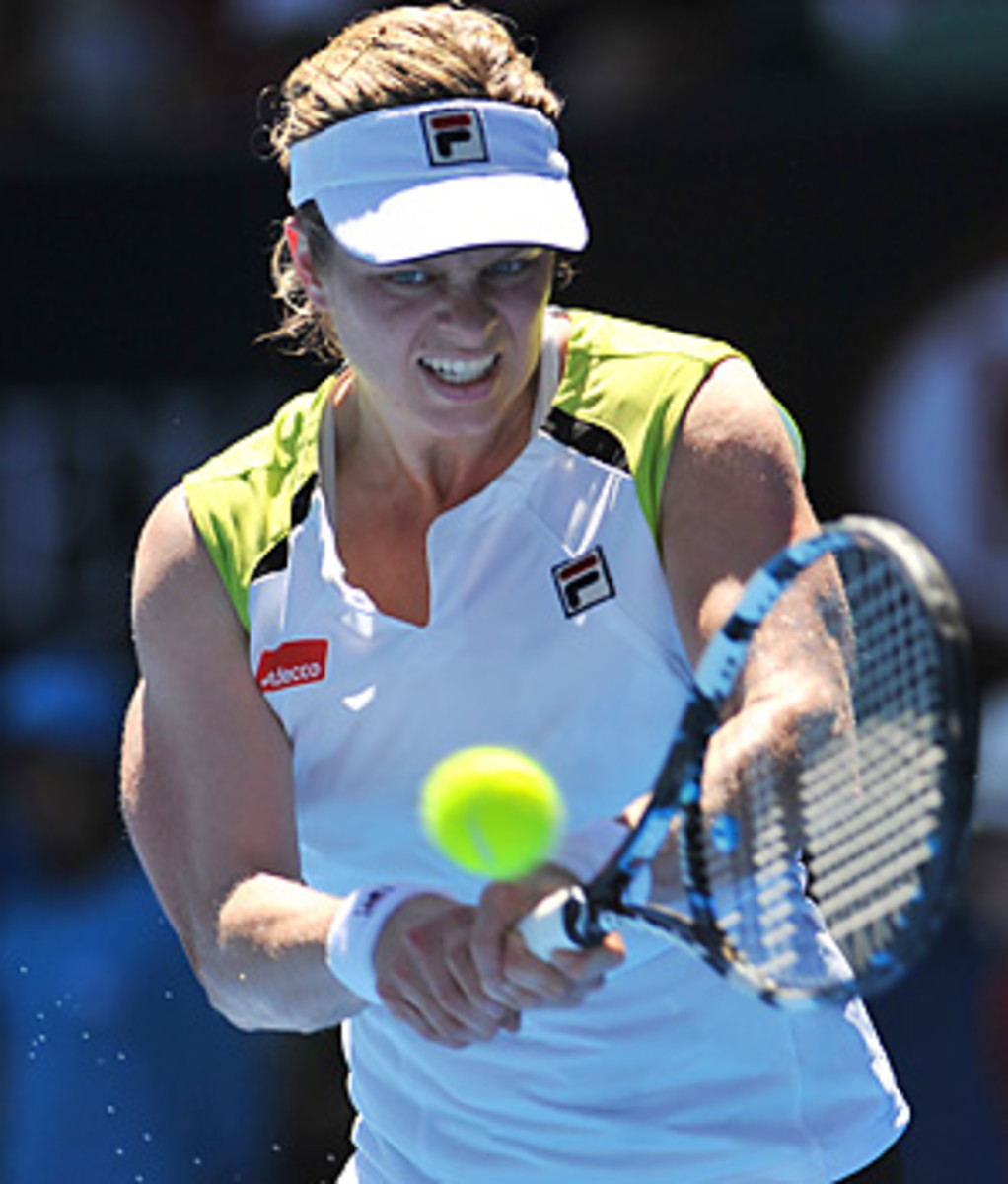Clijsters returns to Aussie semifinals, Wozniacki returns to drawing board
Kim Clijsters might have to beat Nos. 1, 2 and 3 to repeat. (Nicolas Asfouri/AFP/Getty Images)
MELBOURNE, Australia -- The good news for Caroline Wozniacki is she'll no longer have to endure the onslaught of questions regarding her status as the WTA's Slam-less No. 1.
The bad news is her quest to get that monkey off her back at the Australian Open is over after losing to Kim Clijsters 6-3, 7-6 (4) in the quarterfinals on Tuesday. It was a scratchy match most of the way, with Clijsters combining a dominating set and a half before getting nervous and having to settle herself to seal it in the tiebreaker.
Wozniacki's run as No. 1 -- 49 straight weeks and 67 overall -- came to an end as Clijsters, seeded 11th, moved two wins away from defending her Australian Open title in what may be her final appearance here. The new No. 1 will be Petra Kvitova, Maria Sharapova or Victoria Azarenka, Clijsters' semifinal opponent.
Clijsters put to rest any concerns over the health of her ankle, which she sprained in her remarkable fourth-round comeback win over Li Na on Sunday, early in the match, showing off her trademark splits in the second game.
"I'm as best as I can be," Clijsters said, admitting the ankle was a major concern coming into the match. "Instead of really focusing on the match, you're focusing on trying to get the ankle as good as possible. Laying on the couch, every 20 minutes ice, 20 minutes off, 20 minutes ice, 20 minutes off. Leg elevated. Lymphatic drainage, all that stuff."
The precautions and preparations paid off. "I'm very happy with the way that I was able to move," Clijsters said. And though she was a notch slower moving to her left, Clijsters still came out firing and it became abundantly clear she was better than Wozniacki in every facet. The Dane couldn't outdefend her, couldn't outhit her and couldn't work her way through tactically to gain the advantage and switch the match on her terms.
Wozniacki had no success attacking Clijsters' backhand, theoretically weaker given her injury, and when she tried to open up the court to get Clijsters on the run, the Belgian scrambled and was able to recover to get the point back to neutral and retake control. From there, Clijsters took it to her, firing 17 winners to Wozniacki's seven and breaking four times en route to a relatively easy 43-minute first set. And when Clijsters went on to build a 5-2 lead in the second set, the match seemed a foregone conclusion.
But Clijsters, as good as she is, has a reputation for losing her concentration regardless of the score line. And one game from victory, she got tight. Her footwork became nonexistent, and she snatched at balls instead of attacking them. With Clijsters suddenly unable to win rallies off her racket, Wozniacki dug in and made sure she wasn't going to lose them on hers. With Clijsters spraying the ball every which way but in, Wozniacki rallied to force a tiebreaker.
Wozniacki had gone all match without a single backhand winner, a stunning statistic given that it's her better side. But at 3-3 in the tiebreaker she finally stepped into one, hitting a perfect show down the line to go ahead. That must have been the "uh oh" moment for Clijsters, where she thinks, "If she's hitting that shot, I'm in big trouble." But the defending champion seemed to will herself out of her funk and didn't drop a point the rest of the way. At 5-4, she ran around her backhand and blasted an inside-out forehand winner, a gutsy move considering her forehand had been misfiring and that two points earlier she actually had maneuvered around it in order to hit a backhand instead.
But these are the split-second decisions that win championships, and at 28 years old with four majors, Clijsters was the only one on the court who understood that. That shot gave her match point, which she clinched with a swinging forehand volley.
Wozniacki was left to go back to the drawing board after falling to 0-3 against Clijsters and failing to reach the final of a Grand Slam tournament for the ninth straight time.
"Of course, you try to change your strategy when you're losing, because probably that means some of the things you're doing are not the right things," a subdued Wozniacki said. "Obviously it's never fun to lose, but you learn more from your losses than you do from your wins."
Wozniacki doesn't lose often. This one will sting for a while. But if she has the courage to really look at the deficiencies in her game to improve, this match offered a clear blueprint of what she needs to do. She needs a better forehand. She has to be confident in her ability to go down the line on either wing to open up the court. She needs to learn how to attack the net (hint: Don't hit your approach shot to the middle of the court). And she needs to learn how to go for winners when the opening presents itself. At just 21, Wozniacki still has plenty of time to improve, and she'll clearly have more bites at the Grand Slam apple.
Perhaps now that she doesn't feel compelled to defend the top spot she can actually take the time to reconstruct her game. Even without those weapons she's still one of the toughest outs in tennis, and in an era where inconsistency reigns, her steadiness and competitive spirit is a winning foundation upon which to build.
"We are just in January," Wozniacki said. "In the end of the year you see who has played the best, most consistently all year-round.
"I will get it [the No. 1 ranking] back eventually, so I'm not worried."






